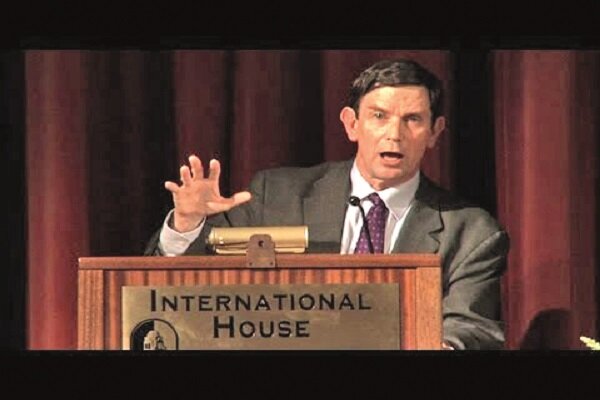Republicans endangering U.S. democracy: professor

TEHRAN- A professor of political science at the University of Pennsylvania says that Republicans’ attempts inspired by former President Donald Trump’s false claims over the November 2020 election may threaten American democracy.
“Donald Trump’s false, deeply anti-American claims that American elections are rigged, which has persuaded Republican voters and officials to adopt new laws to suppress Democratic voting,” Rogers M. Smith tells the Tehran Times.
“Those laws may actually not help Republicans win elections, but they do threaten to endanger American democracy further,” the distinguished professor of political science adds.
Texas Republican lawmakers moved closer Sunday to imposing a slew of new restrictions on voting, as state Senate members voted along party lines to adopt legislation that would make mail-in voting more difficult and prohibit the after-hours and drive-through options that voting rights advocates said helped Black and Latino voters in the Houston area cast their ballots in the 2020 election.
The measure moves Texas closer to joining Florida, Georgia and other states that have seized on Trump's lies about widespread voter fraud and enacted new laws that make voting harder for some of their states' residents.
Apparently, Republicans are concerned about coming elections and that is why they are attempting to restrict voting conditions in a hope to enter the White House at expense of democracy.
Smith says, “Democracy can be undermined in any country, definitely including the United States.”
Following is the text of the interview:
Q: How do you assess the status of democracy in the U.S. as some observers are concerned that persons like Trump can weaken democracy in the country? Now Republicans are seeking to restrict voting in Texas. Don't you think these moves can undermine democracy in the United States?
A: Democracy can be undermined in any country, definitely including the United States. Republicans rightly fear that they are becoming a permanent minority party. They have lost the popular vote in seven of the eight national elections. But they still hope to win elections, due to three things: America’s system of federalism, which over-represents in Congress the small states where Republicans predominate; the more spread-out distribution of Republican voters, which permits them to win more state legislature and congressional districts even when the Democrats have more voters (packed into cities); and Donald Trump’s false, deeply anti-American claims that American elections are rigged, which has persuaded Republican voters and officials to adopt new laws to suppress Democratic voting. Those laws may actually not help Republicans win elections, but they do threaten to endanger American democracy further.
Q: If we suppose that a liberal philosophy constitutes a base for U.S. democracy it can result in "minority rule" in the country. Instead of serving ordinary people the government functions to secure the elites' interests. What is the philosophical basis of U.S. democracy?
A: America’s founding philosophy stressed both republicanism—popular self-governance—and protection for the basic rights of all, including minorities. Today we call that concern for basic rights “liberal.” It is true that it can sometimes protect elite interests against democratic majorities; but it can also protect disadvantaged minorities against majority tyranny. In U.S. history, both things have occurred and still occurred. Neither is inevitable, it depends on whether Americans succeed in governing themselves wisely through their institutions of self-governance.
Q: Let’s turn to gun violence. Why does the U.S. government fail to take a step forward when it comes to gun control law? Is the failure related to attempts of gun lobbies and their financial ties with officials?
A: Under America’s system of federalism, the states have far more power to regulate guns than the U.S. government does. At both levels, however, there are strong gun lobbies that do wield financial influence, and there are also lots of Americans who genuinely believe in easy access to guns. The result, sadly, is that far too often, Americans use guns to kill each other, or themselves.
Q: Do you think that having a democratic system guarantees the rightness of foreign policies? The U.S. has gone through endless wars. We also have other democratic states that colonized other countries. Isn't this a contradiction?
A: No system of government ever has or ever can guaranteed the rightness of foreign policies. The U.S. began a revolution against imperialism, but it is true that it always has been and remains a colonial power. That is a contradiction that the U.S. must continue to struggle to overcome as much as possible. But democracy as a system is not responsible for America’s bad or good choices. The American people, and our leaders, are.
Q: What is your comment on democratization of Iraq and Afghanistan through military invasions? Biden is also withdrawing U.S. troops from Afghanistan while violence is continuing. Your comments please.
A: The U.S. interventions in Afghanistan succeeded in punishing those responsible for the September 11, 2001 attacks. Beyond that, the use of American military force in Afghanistan and Iraq have been extraordinarily costly failures, for the U.S. and for the peoples of those countries. President Donald Trump was a catastrophe for America and the world in many ways, including his callous botching of the Covid 19 pandemic; but as President Biden has recognized, he was right that the U.S. needs to end these interventions.
